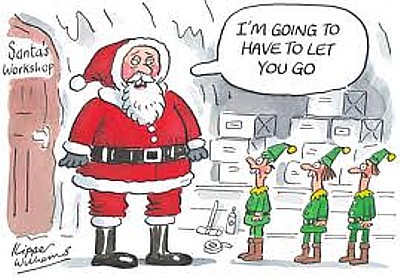What is Euphemism?
A Euphemism is
a polite inoffensive expression words or phrases replaced
for one considered offensive or hurtful that contrarily might be
considered bitter, blunt or unpleasant to hear. In short, the term
euphemism refers to courteous, unintended expressions which is the
substitution of an agreeable or inoffensive expression that replace
words and phrases considered harsh and disrespectful or which suggest
something unpleasant. When the aim is not to offend or hurt someone with
honest intentions.
Possibly
there is no other word in English for which there are more euphemisms
than for the verb “to die.” When someone dies, we say he passed away, passed on or simply passed.
Or he is in a better place now, gone on to his heavenly reward or as
the doctor may have said just as the patient breathed his last breath. “She expired.”
Lets consider a few more Examples:- Collateral damage instead of accidental deaths
- Use the rest room instead of go to the bathroom
- Between jobs instead of unemployed
- Domestic engineer instead of maid

Types of Euphemisms
Examples:
- Passed away instead of died
- Differently-abled instead of handicapped or disabled
- Relocation center instead of prison camp
- Letting someone go instead of firing someone
- On the streets instead of homeless
Examples:
- Adult beverages instead of beer or liquor
- Big-boned instead of heavy or overweight
- Vertically-challenged instead of short
- Economical with the truth instead of liar
- Between jobs instead of unemployed
Example:
- Bit the dust instead of died
- Blow chunks instead of vomited
- Bit the farm instead of died
Examples of Euphemisms
- Retarded - mentally challenged
- Blind - Visually challenged
- Crippled - Differently abled
- Bald - follicularly challenged
- Poor - economically marginalized
- Fat - gravitationally challenged, Overweight
- Lazy - motivationally deficient
- beggar - panhandler, homeless person
- coffin - casket
- old age - golden age, golden years
- criminal (adj) - illegal
- confinement - detention
- lawyer - attorney
- sick - indisposed, ill, under the weather
- toilet - john, WC, men's room, restroom, bathroom, washroom, lavatory
- He is always tired and emotional (drunk). He is a special child (disabled or retarded).
- You are becoming a little thin on top (bald).
- Our teacher is in the family way (pregnant).
- We do not hire mentally challenged (stupid) people.
- The individual was accused of appropriating funds.
- Joey isn’t broke, he is having temporary negative cash flow.
- Sam isn't buying a used car, he is purchasing a pre-enjoyed or pre-loved vehicle.
- Dian's supervisor laid him off because he was unmotivated.
- Politicians don't commit crimes, they 'make mistakes.'
- I don't care if you keep smoking, you'll be the one pushing up the daisies at the age of 40, not me!
- Putting stray dogs to sleep is the most humane thing to do.

Lets consider Euphemisms for death and dying as an example:
| a race well run | definitely done dancing | in a better place | feeling no pain | go west |
| departed | finished | at room temperature | get a one-way ticket | out of his/her misery |
| cross the bar | asleep | join the majority | bite the dust | kick the bucket |
| living-impaired | resting in peace | check out | pass away | no longer with us |
| meet his/her maker | wearing a toe tag | yield up the ghost | kick the oxygen habit | pushing up the daisies |
| six feet under | with the angels | terminated | call home | final curtain call |
Techniques for Creating Euphemism
Euphemism masks a rude or impolite expression but conveys the concept clearly and politely. Several techniques are employed to create euphemism.- It may be in the form of abbreviations e.g. B.O. (body odor), W.C. (toilet) etc.
- Foreign words may be used to replace an impolite expression e.g. faux (fake), or faux pas (foolish error) etc.
- Sometimes, they are abstractions e.g. before I go (before I die).
- They may also be indirect expressions replacing direct ones which may sound offensive e.g. rear-end, unmentionables etc.
- Using longer words or phrases can also mask unpleasant words e.g. flatulence for farting, perspiration for sweat, mentally challenged for stupid etc.
- Using technical terms may reduce the rudeness exhibited by words e.g. gluteus maximus.
- Deliberately mispronouncing an offensive word may reduce its severity e.g. darn, shoot etc.
Euphemism Examples in Everyday Life
Euphemism is frequently used in everyday life. Let us look at some common euphemism examples:- You are becoming a little thin on top (bald).
- Our teacher is in the family way (pregnant).
- He is always tired and emotional (drunk).
- We do not hire mentally challenged (stupid) people.
- He is a special child (disabled or retarded).
Examples of Euphemism in Literature
Example #1
Examples of euphemism referring to sex are found in William Shakespeare’s “Othello” and “Antony and Cleopatra”. In “Othello”, Act 1 Scene 1, Iago tells Brabantio:“I am one, sir, that comes to tell you your daughter and the Moor are now making the beast with two backs.”Here, the expression “making the beast with two backs” refers to the act of having sex.
Similarly, we notice Shakespeare using euphemism for sexual intercourse in his play “Antony and Cleopatra”. In Act 2 Scene 2, Agrippa says about Cleopatra:
“Royal wench!The word “plowed” refers to the act of sexual intercourse and the word “cropped” is a euphemism for becoming pregnant.
She made great Caesar lay his sword to bed.
He plowed her, and she cropped.”
Example #2
John Donne in his poem “The Flea” employs euphemism. He says:“Mark but this flea, and mark in this,In order to persuade his beloved to sleep with him, the speaker in the poem tells her how a flea bit both of them and their blood got mixed in it. This is a euphemism.
How little that which thou denies me is;
It suck’d me first, and now sucks thee,
And in this flea our two bloods mingled be.
Thou know’st that this cannot be said
A sin, nor shame, nor loss of maidenhead;
Yet this enjoys before it woo,
And pamper’d swells with one blood made of two;
And this, alas! is more than we would do.”
Example #3
“The Squealer”, a character in George Orwell’s “Animal Farm”, uses euphemisms to help “the pigs” achieve their political ends. To announce the reduction of food to the animals of the farm, Orwell quotes him saying:“For the time being,” he explains, “it had been found necessary to make a readjustment of rations.”Substituting the word “reduction” with “readjustment” was an attempt to suppress the complaints of other animals about hunger. It works because reduction means “cutting” food supply while readjustment implies changing the current amount of food.
Function of Euphemism
Euphemism helps writers to convey those ideas which have become a social taboo and are too embarrassing to mention directly. Writers skillfully choose appropriate words to refer to and discuss a subject indirectly which otherwise are not published due to strict social censorship e.g. religious fanaticism, political theories, sexuality, death etc. Thus, euphemism is a useful tool that allows writers to write figuratively about the libelous issues.Here are some particularly amusing examples, except where downright offensive.
1. If you are offered a career change or an early retirement opportunity, a career or employee transition, or you are being involuntarily separated, or if personnel is being realigned or there is a surplus reduction in personnel, or the staff is being re-engineered or right sized, or if there is a workforce imbalance correction then: You’re fired!
2. You aren’t poor, you are economically disadvantaged.
3. You aren’t broke, you have temporary negative cash flow.
4. You do not live in a slum but in substandard housing, or in an economically depressed neighborhood, or culturally deprived environment.
5. If you are managing company stakeholders, that means you are lobbying, which is really the same as bribing.
6. When you get an unwanted phone call just as you are sitting down to dinner from a representative of the Republican party (and you are a Democrat) or vice versa, this is called a courtesy call. Only courtesy has nothing to do with it, it’s just freaking annoying.

7. In light of the recent demise of Osama bin Laden, several politicians have stressed that it was the enhanced interrogation methods which caused the informants to squeal and give up the nickname of the courier, which we then followed around until he led us to the compound of OBL. This is one of my personal favorites, not the process it refers to of course, but the absolute ludicrousness of this particular phrase. The ultimate of euphemism. It’s torture, folks! Torture, and you can’t sugarcoat it, and you can’t make it sound nice. Torture.
8. Since we’ve been involved in two wars for ten years, stuff happens, stuff that we don’t want to happen. When you come into a country and break it, for a variety of good reasons, you might cause some collateral damage, which are really deaths of civilians. Women and children and old people. Accidental death. Accidental – but you can’t quite escape the “death” part.
9. When a geographical area is neutralized or depopulated that means the CIA killed people, just because.

10. On a lighter note, intelligent ventilation points, when speaking of a garment are – armholes!

Terimakasih.membantu post nya
BalasHapusTerimakasih.membantu post nya
BalasHapusBest ias coaching in bangalore
BalasHapus.www.globalias.in